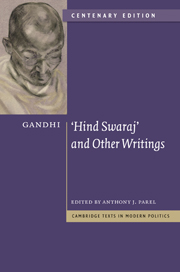Book contents
- Frontmatter
- Contents
- Preface to the centenary edition
- Acknowledgements
- Editor's introduction to the centenary edition
- Editor's introduction to the 1997 edition
- A note on the history of the text
- Principal events in Gandhi's life
- Biographical synopses
- Guide to further reading
- Glossary and abbreviations
- HIND SWARAJ
- SUPPLEMENTARY WRITINGS
- Gandhi's letter to H. S. L. Polak
- Gandhi's letter to Lord Ampthill
- Preface to Gandhi's edition of the English translation of Leo Tolstoy's Letter to a Hindoo
- Gandhi–Tolstoy letters
- Gandhi and the ‘Four Canonical Aims’ of Life (Purusharthas)
- Gandhi–Nehru dialogue
- Economic development and moral development (1916)
- Gandhi on machinery (1919–47)
- Constructive programme: its meaning and place (1941, rev. 1945)
- Gandhi's political vision: the Pyramid vs the Oceanic Circle (1946)
- Draft Constitution of Congress (1948)
- Bibliography
- Index
Constructive programme: its meaning and place (1941, rev. 1945)
Published online by Cambridge University Press: 05 October 2014
- Frontmatter
- Contents
- Preface to the centenary edition
- Acknowledgements
- Editor's introduction to the centenary edition
- Editor's introduction to the 1997 edition
- A note on the history of the text
- Principal events in Gandhi's life
- Biographical synopses
- Guide to further reading
- Glossary and abbreviations
- HIND SWARAJ
- SUPPLEMENTARY WRITINGS
- Gandhi's letter to H. S. L. Polak
- Gandhi's letter to Lord Ampthill
- Preface to Gandhi's edition of the English translation of Leo Tolstoy's Letter to a Hindoo
- Gandhi–Tolstoy letters
- Gandhi and the ‘Four Canonical Aims’ of Life (Purusharthas)
- Gandhi–Nehru dialogue
- Economic development and moral development (1916)
- Gandhi on machinery (1919–47)
- Constructive programme: its meaning and place (1941, rev. 1945)
- Gandhi's political vision: the Pyramid vs the Oceanic Circle (1946)
- Draft Constitution of Congress (1948)
- Bibliography
- Index
Summary
While Hind Swaraj gives the general outline of Gandhi's political philosophy, the ‘Constructive programme’, originally addressed to the members of the Indian National Congress, discusses some of the concrete steps by which that philosophy may be implemented. The value of this document lies in the fact that it illustrates the point that according to Gandhi every sound political philosophy ought to have its corresponding constructive programme – one that contributes to the betterment of the lives of members of civil society. [Ed.]
INTRODUCTORY
The constructive programme may otherwise and more fittingly be called construction of poorna swaraj or complete independence by truthful and non-violent means.
Effort for construction of independence so called through violent and, therefore, necessarily untruthful means we know only too painfully. Look at the daily destruction of property, life and truth in the present war.
Complete independence through truth and non-violence means the independence of every unit, be it the humblest of the nation, without distinction of race, colour or creed. This independence is never exclusive. It is, therefore, wholly compatible with interdependence within or without. Practice will always fall short of the theory, even as the drawn line falls short of the theoretical line of Euclid. Therefore, complete independence will be complete only to the extent of our approach in practice to truth and non-violence.
- Type
- Chapter
- Information
- Gandhi: 'Hind Swaraj' and Other Writings , pp. 169 - 180Publisher: Cambridge University PressPrint publication year: 2009



